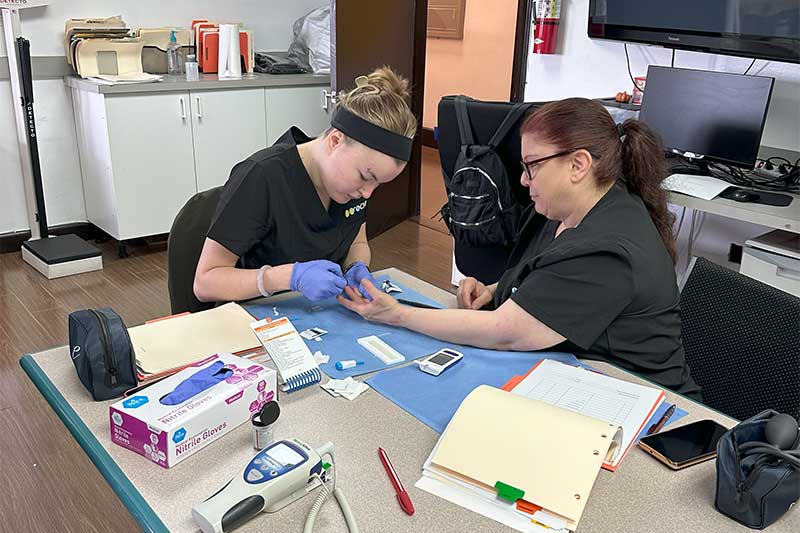Discover the crucial role of certified nursing assistants in hospice care. Learn how they improve patient comfort and provide indispensable support to families during end-of-life care.
Hospice care represents a compassionate approach to end-of-life treatment, where the focus shifts from curative measures to palliative care for people facing life-limiting illnesses. At the heart of this sensitive and crucial healthcare field are Certified Nursing Assistants (CNAs), whose roles are pivotal to the well-being and comfort of patients during their final stages of life.
Discover Role of Certified Nursing Assistants in Hospice Care
For healthcare students considering a path that makes a real difference, the role of a CNA in hospice care offers a unique opportunity to provide comfort, dignity, and respect to patients and their families. This blog post explores the critical role of CNAs in hospice care, including their responsibilities, the emotional support they provide, and the skills required to succeed in this challenging yet rewarding profession.
Discover the important role of certified nursing assistants in hospice care and how they provide comfort and support to patients at a critical time. Learn more about their impact on end-of-life care.
Understanding the Purpose of Hospice Care
Hospice care is designed to treat physical symptoms and address the patient’s and their loved one’s emotional, social, and spiritual needs. Doing so ensures that the patient’s remaining time is lived as fully and comfortably as possible. CNAs are essential team members who contribute significantly to achieving this holistic care approach.
Key Responsibilities of CNAs in Hospice Care
Certified Nursing Assistants are tasked with various responsibilities critical to the daily care of hospice patients. These include:
Personal Care
CNAs provide essential care to maintain the patient’s hygiene, including bathing, grooming, and dressing. Given the sensitivity of the patient’s conditions, CNAs are trained to perform these tasks with the utmost respect to the patient’s dignity and comfort.
Vital Signs Monitoring
Checking and recording vital signs are among the primary duties of CNAs. This includes monitoring temperature, pulse, respiration, and blood pressure. Any changes in these signs can be critical and must be communicated promptly to the nursing staff.
Mobility Assistance
Many hospice patients face difficulties with mobility. CNAs assist patients in moving, positioning, and walking if possible. They play an important role in preventing bedsores and maintaining the patient’s ability to move as much as their condition allows.
Nutritional Support
Providing nutritional support, whether assisting with feeding or ensuring that dietary restrictions are followed, is another significant function of CNAs. Proper nutrition can affect a patient’s comfort levels and overall well-being.
Emotional Support
A less tangible yet equally important aspect of a CNA’s job in hospice care is providing emotional support. CNAs spend significant time with patients and often form close bonds, offering comfort and companionship during a very sensitive time.
The Skills That Make a CNA Exceptional in Hospice Care
The nature of hospice work requires a distinctive set of soft skills alongside technical healthcare skills. Here are several competencies that are particularly valuable:
Compassion
The ability to empathize with patients and their families is central to hospice care. CNAs must be able to provide compassionate care that acknowledges the patient’s dignity in their final days.
Communication
Clear communication is key in this setting—not only to understand and execute care effectively but to support family members and ensure the healthcare team is up-to-date with the patient’s condition.
Emotional Strength
Dealing with death and grief regularly requires immense emotional resilience. CNAs must manage their feelings while also being a pillar of support for others.
Attention to Detail
The ability to notice small changes in a patient’s condition or behavior can lead to important adjustments in care plans. CNAs need a sharp eye for details in order to provide the best care possible.
Adaptability
Circumstances can change quickly in hospice care, and CNAs must be able to adapt their approach to new situations and needs as they arise.
Educational Path for Becoming a Hospice CNA
Healthcare students interested in pursuing a career as certified nursing assistants in hospice care should be prepared to undergo specific training geared toward palliative care. This typically involves:
Completing a State-Approved CNA Program
These programs are available at many community colleges, technical schools, and even some medical facilities. They usually require both classroom learning and clinical practice.
Acquiring Specialized Hospice Training
Some hospices offer additional training focused on end-of-life care practices, which may be covered only a little in standard CNA programs.
Obtaining Certification
Passing a state certification exam is crucial to becoming a CNA. This exam often includes both a written component and a practical skill assessment.
Continuing Education
To provide the best care, CNAs in the hospice field must continue learning throughout their careers. This could include updated care techniques, new palliative care findings, and coping strategies for dealing with the emotional challenges of the job.
The Unique Challenges and Rewards of Hospice Work
Pursuing a career as a hospice CNA is challenging. The work can be physically demanding and emotionally taxing. Each day can present difficult and heart-wrenching situations as CNAs watch patients and their families grapple with loss and grief. However, it’s within these challenges that the rewards are found.
Many CNAs in hospice care describe their work as a calling. The ability to offer solace, alleviate suffering, and ultimately improve the quality of a person’s final days provides a profound sense of fulfillment and purpose. The relationships formed with patients and families often leave lasting impressions and validate the significance of the care provided.
Final Thoughts
The role of Certified Nursing Assistants in hospice care is one of the noblest in the healthcare field. It allows for a level of patient contact and care unmatched by most other professions. For healthcare students willing to take on the responsibilities and emotional investment required, becoming a CNA in hospice care offers unparalleled opportunities to impact people’s lives when it is most needed.
This vital contribution to the healthcare system is rewarding on both a professional and personal level. It demands the best of those who choose to pursue it, but it also offers the chance to make a difference truly. As the need for quality hospice care continues to rise, so too does the need for compassionate and skilled CNAs dedicated to this pivotal role.




